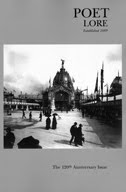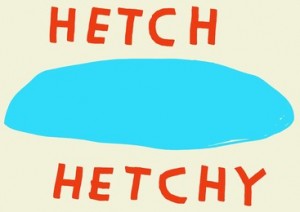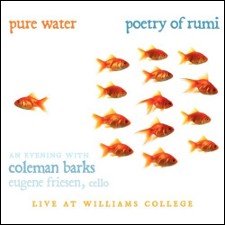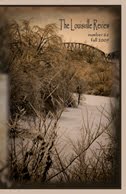 BETHESDA, MD (Oct 14) — Poet Lore, the nation’s oldest continuously published poetry journal, marks its 120th anniversary this year.
BETHESDA, MD (Oct 14) — Poet Lore, the nation’s oldest continuously published poetry journal, marks its 120th anniversary this year.
At a time when many literary journals (and the publishing industry of which they are part) are struggling, Poet Lore, with its distinctive historic look, has remained true to its core value — bringing great poetry to light — and created a proven and lasting nationwide identity. E. Ethelbert Miller and Jody Bolz carefully read every submission they receive, and their work reaffirms the value of poetry in a landscape that often devalues the written word. “Poetry may not be regarded as culturally central,” Jody Bolz explains, “but it’s still what people turn to at the most important moments in their lives. At every life-cycle ritual—from naming ceremonies to funerals—the language of poetry speaks to us and speaks for us. As editors, our role is to connect poets and readers, building upon Poet Lore‘s 120-year-long record of literary discovery.”
That 120-year-long record is what Poet Lore and its publisher, The Writer’s Center, honor. It’s a rich and varied story, and as you’ll see below, the journal has played an active and important role in bringing literary talent to light.
Founded in 1889 by two brilliant, iconoclastic scholars, Helen Clarke and Charlotte Porter, as a journal “devoted to Shakespeare, Browning, and the Comparative Study of Literature,” Poet Lore developed an early following among literary societies and later expanded its influence by offering unique features, such as its “Play Series” — which in 1913 was the first to print a complete, English-language edition of Anton Chekhov’s play “The Seagull.” And Walt Whitman, in the final year of his life, ran three paid advertisements in Poet Lore for Leaves of Grass.
During the course of its illustrious history, Poet Lore has played an active role in introducing American readers to the likes of some of the finest international poets. In its early years, in fact, very few American authors were published in Poet Lore. For the majority of its content, Poet Lore set its sights abroad. Among the many authors who were discovered or whose careers on the international stage were advanced by Poet Lore include Maxim Gorky, Henrik Ibsen, Frederic Mistral, and August Strindberg. And it was among the first publications to introduce the work of Bengali poet and Nobel Prize winner Rabindranath Tagore to American readers. In the late 20th Century, Poet Lore published the early work of such remarkable American poets as Mary Oliver, Colette Inez, Cornelius Eady, Carl Phillips, Carolyn Forché, Sharon Olds, Dana Gioia, Pablo Medina, and Alice Fulton, among many others. In recent years, the editors were the first to publish the poetry of Dwayne Betts, who sent his submission from prison.
SURPRISING FACTS ABOUT POET LORE:
Founders Charlotte E. Porter and Helen A. Clarke were writers, editors, Shakespeare and Browning scholars, and literary critics at a time when women in these roles were few and far between. Porter composed poetry, Clarke wrote musical compositions, and both wrote essays and reviews that appeared in early editions of Poet Lore and elsewhere.
Porter and Clarke were both named “Helen” at birth. Charlotte later changed her name from Helen Charlotte Porter to Charlotte Endymion Porter, borrowing her middle name from the Keats poem. The two women exchanged rings in a commitment ceremony and lived together until Helen A. Clarke died at age 65. Charlotte Porter scattered Helen’s ashes by their summer home in Penobscot Bay, Maine.
Whitman advertised his finally completed Leaves of Grass in three 1892 editions of Poet Lore.
Poet Lore was famous in the early 20th century for translations, publishing, for example, an early edition of Chekhov’s “The Seagull” in its folios and presenting literary luminaries like Ibsen, Strindberg, Gorky, D’Annunzio, Mistral, and Tagore to readers early on.
The first piece of writing F. Scott Fitzgerald ever placed (outside of school publications) was the poem “The Way of Purgation.” He sold it to Poet Lore in September of 1917, but for reasons unknown to the current publishers, it didn’t appear in the next issue, or any subsequent. It was finally printed in our Winter 1989-1990 issue (Vol. 84, No. 4) with the note: “Poet Lore apologizes for any inconvenience this delay may have caused.”
Poet Lore’s executive editors read all submissions, without regard to the reputation of the poet, year-round. They meet in Washington, D.C., to read aloud their selections and winnow the stacks of poems.
About The Writer’s Center: Since 1987, Poet Lore has been published by The Writer’s Center in Bethesda, MD. The Writer’s Center cultivates the creation, publication, presentation, and dissemination of literary work. We are an independent literary organization with a global reach, rooted in a dynamic community of writers. As one of the premier centers of our kind in the country, we believe the craft of writing is open to people of all backgrounds and ages. Writing is interdisciplinary and unique among the arts for its ability to touch on all aspects of the human experience. It enriches our lives and open doors to knowledge and understanding. The Writer’s Center is a 501 (c) (3) nonprofit organization. We are supported in part by The Arts and Humanities Council of Montgomery County, and by a grant from the Maryland State Arts Council, an agency funded by the State of Maryland and the National Endowment for the Arts.





